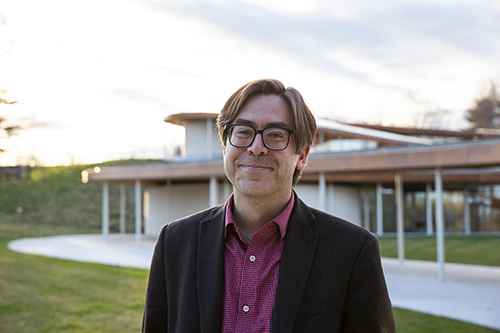By Dr. Matthew Croasmun, Faith Initiaitve Director, Grace Farms Foundation
There may be no single nexus in upper- and middle-class society more revelatory of our hearts than our college dreams for our children.
So, what do these dreams say about what it is that we value most and how our desires will influence our young peoples’ lives?
As a lecturer at Yale, teaching courses on A Life Worth Living, as the Faith Initiative Director at Grace Farms, and as a parent myself, I daily explore questions about what it means to pursue flourishing life. In every arena of my life, my calling is to help people ask and begin to answer the most important question of our lives.

Dr. Matthew Croasmun is the Foundation’s first Faith Initiative Director. In this role, he develops and implements opportunities for contemplation, dialogue, and study across a variety of religious, spiritual, and ethical traditions. © Vanessa Van Ryzin
You can state it multiple different ways: What is the shape of flourishing life? What is a good life? However you phrase it, this question is the fundamental question of our lives. Every day, our dreams, our values, our thoughts and actions are shaped by and oriented toward some vision of the life we believe to be worth pursuing. Articulating, assessing, and revising that vision is what Grace Farms’ Faith Initiative is all about.
What Is Flourishing or a Good Life?
And yet, this question itself can be hard for people to really grasp. Often the first response is puzzlement. “What do you mean ‘flourishing life’ or ‘a good life’?”
The question can become clearer when you think about the sort of life that you want for your children. Think about the sort of life you’ve wanted for your kids since before you knew them—the sort of life you wanted for them when all you knew was that you loved them and wanted the best for them. That’s your vision of a good life. That’s your vision of flourishing life.
These days, particularly in certain sorts of communities in our society, many of our dreams for our children to attain flourishing life run through a particularly potent juncture: college. College is that gate through which our young people have—or do not have — access to the sorts of lives we want for them. It’s no wonder, then, that college preparation and admissions become anxiety points that organize our entire lives: where we live, where we send our kids to school, what activities we encourage our children to take up, what sort of careers we ourselves pursued to begin with in order to provide that house, school, and set of opportunities we wanted for our children.
For some parents and concerned “grown-ups,” it may be that the college dream aligns rather straightforwardly with their vision of flourishing life. Get into a good college, amass the sort of intellectual, creative, and social capital that college offers, and you’ll have access to all that the good life entails: an open and curious mindset, a global network of influential colleagues, an attractive and worthy mate (should you want one), and, most of all, a lucrative and fulfilling career that results in a positive impact on the world worthy of a life’s labor.
What Is Success?
That’s “success,” right? What more could one want?
Nevertheless, for many of us, we look at the roadmap above and instinctively recoil. Where is the value on personal fulfillment (not just career)? What about doing what’s right? What about the more circuitous path? Where is the joy?
And yet, every time our kids take a step off that narrow path that “everyone” (who, exactly?) calls “success,” there’s something in us that worries even as we nod in approval. Our hearts are divided. There are two (or more) visions of flourishing life that contend for our allegiance and make us mercurial champions of our young people: sometimes cheering for their traditional “success,” sometimes cheering their “rebellion” against the track they’ve been given to run on.
The fact is that, like the young people on whose behalf we do so much worrying, many of us don’t have a vision of flourishing life solid enough to stand up to what the culture around us champions. We know the good life must be kinder, more humane and capacious than the careerist dream everyone seems to “know” is less than worthy of our humanity. But knowing what the good life is not the same as knowing what it is.
It’s not my place to supply answers. Each of us needs to answer these questions ourselves. But we need to do the work and consider carefully what the college game reveals to us about our highest ideals—and about the weakness of our commitment to them. As families and as a community, we need to enter into serious reflection and dialogue about these questions.
At Grace Farms, on Friday, February 21, we’re going to kick off this conversation. Joining me and providing their valuable perspectives will be Dr. Karen Eshoo, head of King School in Stamford and Dr. Frank Bartolomeo, Director of Adolescent Services at Silver Hill Hospital in New Canaan. Dr. Eshoo will be contributing her expertise as an educator who thinks deeply about what education provides beyond college admissions and access to certain careerist dreams. Dr. Bartolomeo will bring his years of experience working with adolescents struggling with depression and anxiety. I hope you’ll join us. And I hope our conversation will spark an important conversation for you, your family, and our community as a whole.
Sign up for our newsletter to learn more about Grace Farms’ programs and our initiatives: nature, arts, justice, community, and faith.

